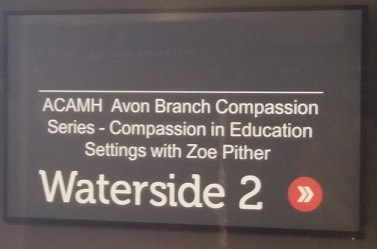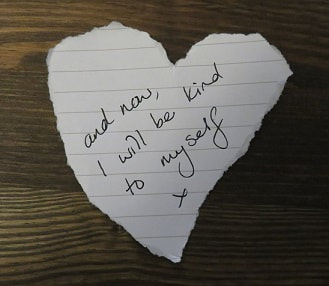 Last week I was invited to give a talk for the Association for Child and Adolescent Mental Health about Compassion in Education Settings. I've worked in diversity & inclusion and student services for many years, combined with my mindfulness practice, it felt all the different areas of my work came together and made sense. After all, I've built a career out of fighting for equality in education and helping other people feel better. I'd been working towards this moment for years. I planned the outline months ago: a broad overview of the context around mental health and wellbeing in schools and higher education; a summary of the latest research into the benefits of mindfulness practice and then wrapping it up in a conclusion about the absolute necessity of teaching compassion within our education system - not just to our teachers, nurses, doctors as the literature reflects, but also to our lawyers, our engineers, our entrepreneurs, our bankers... because surely if we can teach people to make compassionate decisions about their work, whatever their work is, then that can only be good for society, humanity and ultimately the planet, right? Well, yes... but when I came to start putting together the detail of the talk things took a different track. Because it turns out that what I was discovering was that developing self-compassion improves self-efficacy and makes us better learners. It makes us more resilient, less afraid of failure and better able to cope with it when it happens, more interested in learning for it's own sake, less likely to procrastinate, better able to estimate our own abilities. Self compassion is strongly associated with optimism, happiness, positive affect, personal initiative, wisdom, curiosity and exploration, extroversion, agreeableness, and conscientiousness. Studies have found that changes in self-compassion and wellbeing go hand in hand for both adults and adolescents. Not only that but boosting our self-compassion also makes us more compassionate towards others. So actually, teaching self-compassion that could revolutionise education for young people and adult learners alike.  Dr. Kristin Neff describes self-compassion as 'the ability to hold one's feelings of suffering with a sense of warmth, connection, and concern.' So it means valuing yourself, not because you’ve judged yourself positively and others negatively but because you’re intrinsically deserving of care and concern - just like everyone else. Where battling for self-esteem can leaves us caught in a trap of comparison and judgement, powerless and distraught, self-compassion is at the heart of empowerment, learning, and inner strength. It means treating our own pain and struggles with the same kindness that we would offer someone we care for deeply. Sounds good huh? Except, somehow or other many of us struggle to do that. We tend to be much harder on ourselves than we would on pretty much anyone else. Whether you believe it's innate or driven by culture we compare ourselves to others and find ourselves wanting, and this can lead to self-criticism and shame. What if we could hold our own suffering with the deep tenderness we would have for a child or a loved one who was feeling sad or afraid? Honestly, for me this has been a lifetime's work - see December's blog for example. So when this talk was coincidentally followed by a few days of emotional roller-coaster, I knew which practices to turn to and how to check-in and treat myself with true tenderness and care. So my advice is don't wait until you're feeling bad. Can you start strengthening your self-compassion now? That way you'll have a reserve of self-kindness when you need it most, ready for the difficult times that we all experience at some point. If you're in any doubt about the power of self-compassion then I wholeheartedly recommend taking some time to explore Kristin Neff's work. She's probably the leading researcher focusing on self-compassion at the moment and she's also a deeply generous practitioner. Her website is full of resources and free downloads that can help you build those self-compassion muscles. Tara Brach also has some excellent self-compassion resources including her guided mediation the RAIN of self-compassion. So, what are you waiting for? The world needs you to treat yourself kindly.
1 Comment
|
Archives
October 2020
Categories |
 RSS Feed
RSS Feed
